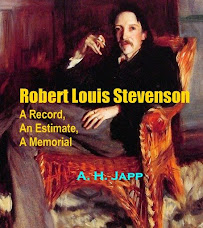NOW, it is in its own way surely a very remarkable thing that Stevenson, who, like a youth, was all for HEITERKEIT, cheerfulness, taking and giving of pleasure, for relief, change, variety, new impressions, new sensations, should, at the time he did, have conceived and written a story like THE MASTER OF BALLANTRAE - all in a grave, grey, sombre tone, not aiming even generally at what at least indirectly all art is conceived to aim at - the giving of pleasure: he himself decisively said that it "lacked all pleasurableness, and hence was imperfect in essence." A very strange utterance in face of the oft-repeated doctrine of the essays that the one aim of art, as of true life, is to communicate pleasure, to cheer and to elevate and improve, and in face of two of his doctrines that life itself is a monitor to cheerfulness and mirth. This is true: and it is only explainable on the ground that it is youth alone which can exult in its power of accumulating shadows and dwelling on the dark side - it is youth that revels in the possible as a set-off to its brightness and irresponsibility: it is youth that can delight in its own excess of shade, and can even dispense with sunshine - hugging to its heart the memory of its own often self-created distresses and conjuring up and, with self-satisfaction, brooding over the pain and imagined horrors of a lifetime. Maturity and age kindly bring their own relief - rendering this kind of ministry to itself no longer desirable, even were it possible. THE MASTER OF BALLANTRAE indeed marks the crisis. It shows, and effectively shows, the other side of the adventure passion - the desire of escape from its own sombre introspections, which yet, in all its "go" and glow and glitter, tells by its very excess of their tendency to pass into this other and apparently opposite. But here, too, there is nothing single or separate. The device of piracy, etc., at close of BALLANTRAE, is one of the poorest expedients for relief in all fiction.
Will in WILL O' THE MILL presents another. When at the last moment he decides that it is not worth while to get married, the author's then rather incontinent philosophy - which, by-the-bye, he did not himself act on - spoils his story as it did so much else. Such an ending to such a romance is worse even than any blundering such as the commonplace inventor could be guilty of, for he would be in a low sense natural if he were but commonplace. We need not therefore be surprised to find Mr Gwynn thus writing:
"The love scenes in WEIR OF HERMISTON are almost unsurpassable; but the central interest of the story lies elsewhere - in the relations between father and son. Whatever the cause, the fact is clear that in the last years of his life Stevenson recognised in himself an ability to treat subjects which he had hitherto avoided, and was thus no longer under the necessity of detaching fragments from life. Before this, he had largely confined himself to the adventures of roving men where women had made no entrance; or, if he treated of a settled family group, the result was what we see in THE MASTER OF BALLANTRAE."
In a word, between this work and WEIR OF HERMISTON we have the passage from mere youth to manhood, with its wider, calmer views, and its patience, inclusiveness, and mild, genial acceptance of types that before did not come, and could not by any effort of will be brought, within range or made to adhere consistently with what was already accepted and workable. He was less the egotist now and more the realist. He was not so prone to the high lights in which all seems overwrought, exaggerated; concerned really with effects of a more subdued order, if still the theme was a wee out of ordinary nature. Enough is left to prove that Stevenson's life- long devotion to his art anyway was on the point of being rewarded by such a success as he had always dreamt of: that in the man's nature there was power to conceive scenes of a tragic beauty and intensity unsurpassed in our prose literature, and to create characters not unworthy of his greatest predecessors. The blind stroke of fate had nothing to say to the lesson of his life, and though we deplore that he never completed his masterpieces, we may at least be thankful that time enough was given him to prove to his fellow-craftsmen, that such labour for the sake of art is not without art's peculiar reward - the triumph of successful execution.
http://www.KosTvShow.com , Full Movies , Unlimited Full Software Download
Mp3 Full Games,ebooks and Tutorials,Serial and Patches.
Game Hacks and Lots more Visit http://www.KosTvShow.com , and Download
Unlimited Files for FREE, Good Luck and Enjoy Free Stuff.
Mp3 Full Games,ebooks and Tutorials,Serial and Patches.
Game Hacks and Lots more Visit http://www.KosTvShow.com , and Download
Unlimited Files for FREE, Good Luck and Enjoy Free Stuff.
Thursday, 14 August 2008
Subscribe to:
Post Comments (Atom)

No comments:
Post a Comment